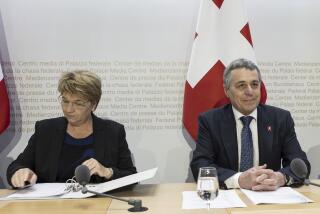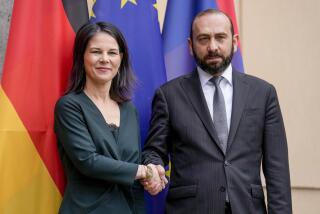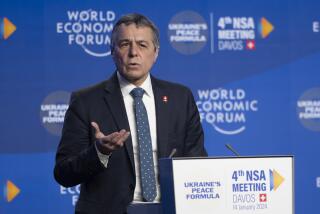Afghan Talks in Germany Moved to Castle Near Bonn
- Share via
BERLIN — U.N. organizers of negotiations to form a transition government for Afghanistan announced Wednesday that they were moving the talks to a secluded Rhine River retreat near Bonn in an apparent attempt to sequester the fractious delegates and force swifter agreement.
German Foreign Ministry officials, who cast their nation’s role in hosting the talks that are expected to start Monday as purely technical, said the gathering was being relocated from Berlin because the Petersberg castle offered better security.
But the move may be more focused on controlling what happens inside the meeting site rather than outside. While Berlin has a raft of hotels and conference centers, the castle in the town of Koenigswinter can easily be sealed off from media and other distractions.
Diplomatic sources said Lakhdar Brahimi, U.N. special representative for Afghanistan, wanted a more remote location so the Afghan factions could work without interference.
Negotiators will try to cobble together an interim Afghan government from among politicians of the opposition Northern Alliance, supporters of exiled monarch Mohammad Zaher Shah, and representatives of major ethnic and refugee groups. The talks are expected to last several days.
How well and how quickly the rivals work together to create a governing alliance will be a litmus test for Afghanistan’s future. After centuries of foreign intrigue and more than two decades of war, previous attempts to put together a leadership reflecting the country’s diverse population have ended in failure and bloodshed.
But those trying to broker an administration for the Central Asian nation in the aftermath of the Taliban regime’s collapse say they are hopeful.
“I return a good deal more optimistic than I left that we have an opportunity to promote the early development of a broad-based government in Afghanistan which the international community can assist,” said U.S. envoy James Dobbins during a stopover in London after consulting with Afghan factions throughout Europe and Asia.
Brahimi has urged organizers to keep the number of delegates to a minimum, perhaps 30. But German Foreign Ministry spokeswoman Sabine Sparwasser indicated that preparations were being made for about twice that number.
Representatives from the United States, Britain, Russia and Pakistan also will take part. Top German officials are not expected to be involved.
The Northern Alliance, which claims to control much of Afghanistan, will send a negotiating team headed by Interior Minister Younis Qanooni. The exiled king, who was deposed in 1973 after ruling for 40 years, will send a high-ranking delegation, an aide told reporters, hinting that a woman might be among them.
Women have been systematically demeaned during the five-year rule of the fundamentalist Taliban, but other Afghan political, religious and ethnic factions also have relegated women to second-class status, depriving them of education and freedom of movement.
Foreign governments that have been pressing for the talks, primarily the U.S. and Britain, also have expressed concern that the ethnic Pushtuns of southern Afghanistan, where the Taliban still has strongholds, will have too little say in the country’s future.
Germany likely emerged as the site of talks because it has long-standing trade ties with Afghanistan and other Islamic states and is perceived as a more neutral host than other Western nations. It has the largest population of Afghan exiles and refugees in Europe, with 100,000 nationwide.
Germany has committed 3,900 troops and extensive equipment to the U.S.-led war against the Taliban and the hunt for Osama bin Laden. But none of those forces have been deployed, and a significant faction of Germans opposes military strikes against Afghanistan.
More to Read
Sign up for Essential California
The most important California stories and recommendations in your inbox every morning.
You may occasionally receive promotional content from the Los Angeles Times.











